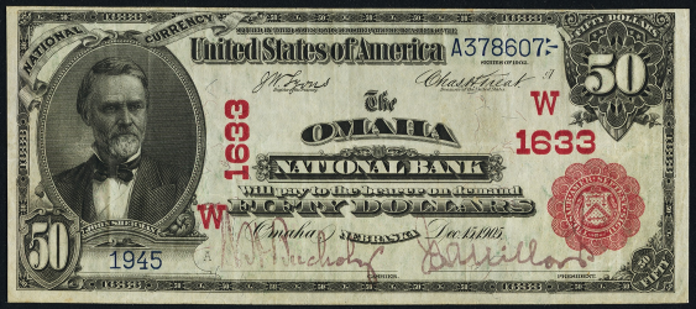Fifty Dollar Notes › Nationals › 1902 Fifty Dollar National Bank Notes › Oklahoma Charters › 1902 $50 Tonkawa Oklahoma Farmers National Bank
Get Value Now
| Item | Info |
|---|---|
| Series | 1902 |
| Charter | #11397 Farmers' National Bank of Tonkawa, Oklahoma |
| Year Chartered | 1919, 288 Banks Chartered |
| City Info | Tonkawa is a city in Kay County, Oklahoma, United States, along the Salt Fork Arkansas River. The population was 3,216 at the 2010 census, a decline of 2.5 percent from 3,299 at the 2000 census. Named after the Tonkawa tribe, the city of Tonkawa was founded in March 1894, by Eli V. Blake and Wiley William Gregory. Blake and Gregory, originally from Kansas, claimed the land that would become Tonkawa in the Land Run of 1893. Prior to the land run, from 1879 to 1885, this area was home to the Nez Perce. The Blackwell and Southern Railway built a line through Tonkawa, which stimulated growth of the town. In 1901, the Oklahoma Territory Legislature established the University Preparatory School here. By statehood, the population was 1,238. The discovery of oil caused a boom in the 1920s, and the population was 3,311 in 1930. Source: Wikipedia |
| Similar Cities | If your note doesn't match try: 1. Tonkawa, Oklahoma - First National Bank 2. Tonkawa, Oklahoma - Tonkawa National Bank 3. Tonkawa, Oklahoma - American National Bank |
| Seal Varieties | Red, Blue |
| Other Info | 1. Value depends on notes known for charter, condition and market demand. |
| Neat Fact | Red Seals issued in sheets of 2 Notes: 1 $50 Note & $ $100 Note (Friedbergs, 20th Ed. P135) |
No Obligations Offers and Appraisals
Please submit a good photo or scan. It will be identified and evaluated. Understand there may be subtle differences between the image you see above and your note. Signatures, design, markings and note condition will determine the offer price. Notes in Uncirculated or better condition receive the best offers.
Appraisals can be estimated for wholesale and retail prices. Wholesale is what dealers typically pay. Retail is what a collector might pay. Retail is slightly higher in most cases.
Please visit this page for USA Paper Money Reference. Do not treat this page as a reference guide, it is for appraisal and acquisition purposes only.
